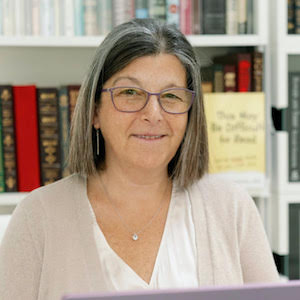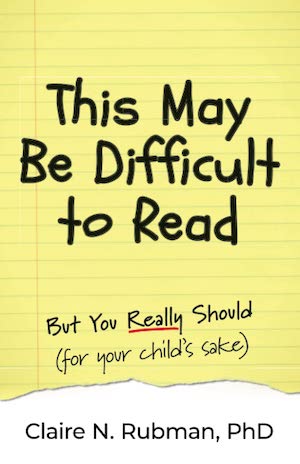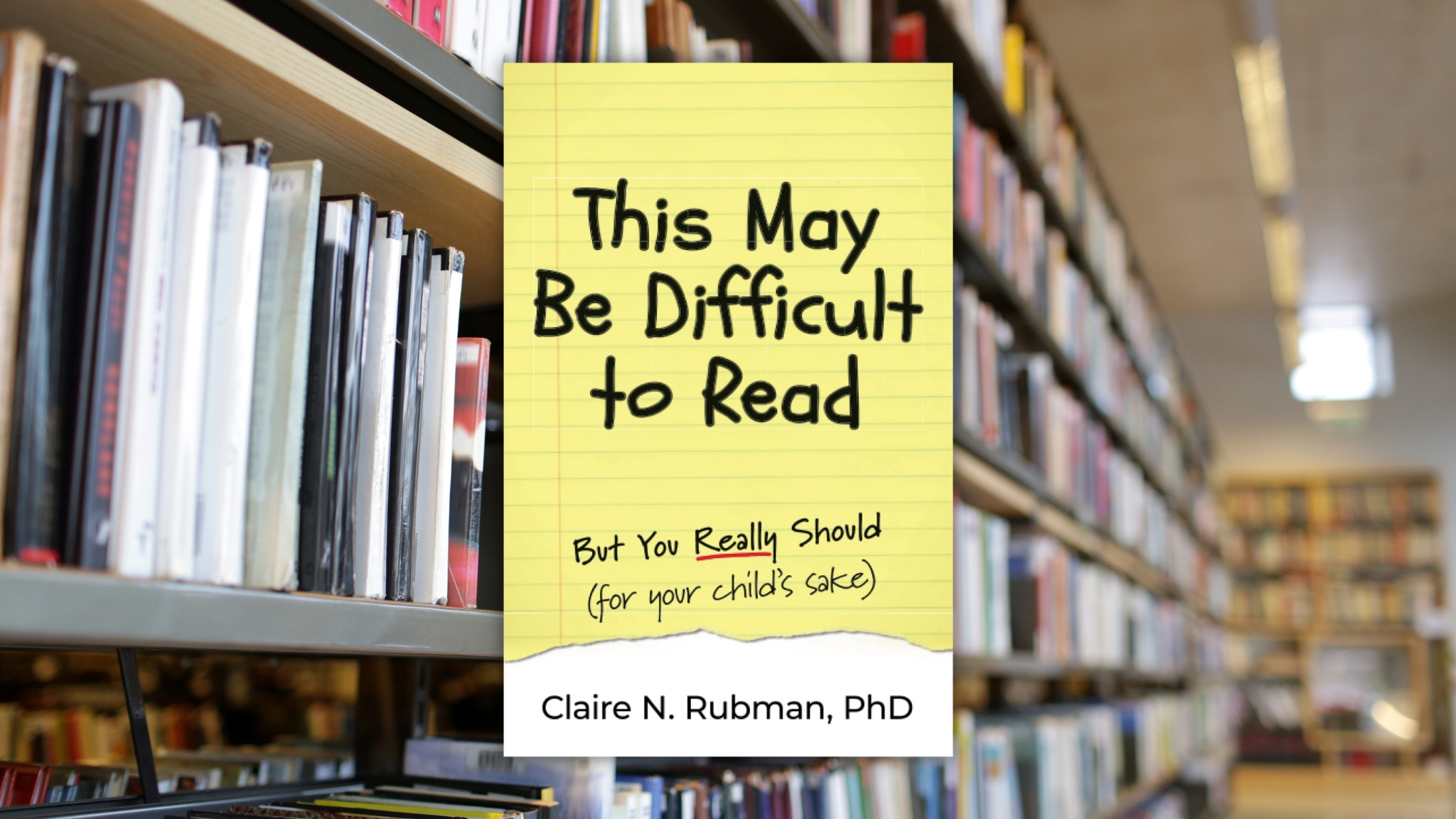This May Be Difficult to Read: But You Really Should (for your child's sake) by Dr. Claire N. Rubman
When I was a child, I could play the piano by ear. If I could whistle a tune, I could play it on the piano. My parents recognized this and got me taking lessons at a young age. I was pretty good. Grownups were really impressed. This kid’s going places, they’d say.
You know where I went? Nowhere.
Is it possible my learning skills, as far as the piano was concerned, peaked too early? As I got older, when you might have expected me to flourish with a bit more maturity, it was too late — I had already learned the bulk of what I was going to learn, before my formative learning years, I tuned out the desire to study much more, and would make only marginal progress from there.
I wonder what Dr. Claire N. Rubman would say about that.
Rubman, a cognitive developmental psychologist with more than 30 years in the classroom, has scoured the research, made her own professional observations and notes from personal experience and put together a fascinating book that takes aim at what’s wrong with the learning process — reading in particular — and has set out to offer solutions. The book has been awarded the 2023 National Parenting Product Award and a gold-level Mom’s Choice Award.
The book certainly has an appropriate title: This May Be Difficult to Read. Within it, the author breaks down myths about reading (including the above example of “learning too soon”), separates fact from fiction and works to get parents and educators on the right course. Choosing the right strategy for children to read, Rubman believes, is “the most politicized topic in the field of education.”
“I’ve watched my children succeed and fail with phonics, reading, reading comprehension, and learning,” she says. “I’ve seen our collective children hurting and I’ve also seen them succeed beyond their wildest dreams. I have such a passion for watching them develop a love for reading and learning that I wanted to share it with you.”
An Education Emergency
So just how big is the reading crisis?
Rubman points out that 42 million American adults are defined as functionally illiterate — put another way, in more practical terms, they can’t follow the directions on a can of soup. What’s more, one in five college freshmen enrolls in a remedial reading class, costing families nearly $1.5 billion.
It doesn’t help that parents in general are obsessed with test scores and labels. Many parents, Rubman says, “are twitching in eager anticipation of kindergarten test scores to validate their beliefs in their child’s abilities, greatness or normalcy.”
Here are some of the other myths the book explores:
- If children can “sound out” the words, then they can “read.”
- Listening to classical music makes children smarter.
- Smaller words are easier to read.
- Telling children facts will make them smarter.
- It’s better for your child to read to you than for you to read to your child.
Rubman tells a classic story about how a 4-year-old boy was able to read the word “hot” on a water cooler but had no idea of the implications, just that he could recognize the letters and the word. Rubman’s 4-year-old son was “unperturbed by his illiteracy” but able to comprehend the real-world meaning of the word. So there’s the matter of reading just for reading’s sake vs. reading and understanding the meaning — especially at such a young age.
This point is accentuated through various exercises Rubman presents of children reading short passages and failing to identify inconsistencies the narrative – which would not occur if the reader was grasping the meaning of the passage and “comprehending” it rather than just reading it.
Advice From a Professional — Who’s Also a Parent
So what is her solution? For starters, she says, we have to think like a child thinks. “Together we can look at the learning process through a child’s eyes and more fully appreciate how children think, learn and process information. Remember, their brains are different from our brains.”
Rubman’s writing style is both scholarly and relatable. She knows her stuff, is quite thorough, and supplements her learning points with personal examples of the how and why, often using her own family as her “characters.” She takes a complex topic and makes it user-friendly and readable so that it can be processed and actually enjoyed by a larger audience than just literacy professionals and learned parents. The book is chock full of information from research, case studies and examples and even some exercises to try out to help make her points.
She tackles reading theories and strategies, even government initiatives, from every angle, explaining what got us to where we are, what stands in the way of where we need to go and making suggestions to help us get there. But for those expecting the perfect blueprint for reading success, well, years and years of heading down a wayward path is not going to be corrected overnight.
Reading this book and feeling Rubman’s passion to inform us — as both the professional and the parent that she is – is valuable and enlightening.
She knows it’s difficult to be a parent. And it’s difficult to be a teacher. And it can be twice as hard being a parent who tries to teach. But she leaves us with great food for thought, and much optimism:
“This book is about inspiring the greatest number of children to love reading and the comprehensive process so that they can’t wait to pick up a book or dive into a textbook,” Rubman says, adding, “That might be a tad too optimistic, but you get the point.”
“It’s time to reinvent the reading process to ensure that all of our children can make their own soup someday.”
 Dr. Claire N. Rubman is a cognitive, developmental psychologist who has taught in the classroom for over 30 years and raised three of her own children. She has seen the struggle first-hand. She earned her PhD from Stony Brook University in 1994 and has been teaching and raising children ever since. She has been teaching at Suffolk County Community College in New York for over 20 years. Aside from work in the classroom, she has given lectures around the country, published magazine articles, served as an “Ask the Expert” for Texas Family Magazine, edited books for McGraw-Hill, worked as a consultant for Relay/GSE, and presented workshops and lectures for the “Distinguished Speaker Series” and the Child Care Councils of Suffolk and Nassau County, NY. Publications, lectures, and workshop topics include: “Pixels vs Play: A Cognitive Developmental Exploration of Play,” “Neuropsychology and Cognition in the Classroom,” “Reading: The Magic Formula,” and “Reading It All Wrong.” She has been awarded the 2023 National Parenting Product Award and a gold-level Mom’s Choice Award for her book This May Be Difficult to Read. Visit her website at https://difficulttoread.com.
Dr. Claire N. Rubman is a cognitive, developmental psychologist who has taught in the classroom for over 30 years and raised three of her own children. She has seen the struggle first-hand. She earned her PhD from Stony Brook University in 1994 and has been teaching and raising children ever since. She has been teaching at Suffolk County Community College in New York for over 20 years. Aside from work in the classroom, she has given lectures around the country, published magazine articles, served as an “Ask the Expert” for Texas Family Magazine, edited books for McGraw-Hill, worked as a consultant for Relay/GSE, and presented workshops and lectures for the “Distinguished Speaker Series” and the Child Care Councils of Suffolk and Nassau County, NY. Publications, lectures, and workshop topics include: “Pixels vs Play: A Cognitive Developmental Exploration of Play,” “Neuropsychology and Cognition in the Classroom,” “Reading: The Magic Formula,” and “Reading It All Wrong.” She has been awarded the 2023 National Parenting Product Award and a gold-level Mom’s Choice Award for her book This May Be Difficult to Read. Visit her website at https://difficulttoread.com.





